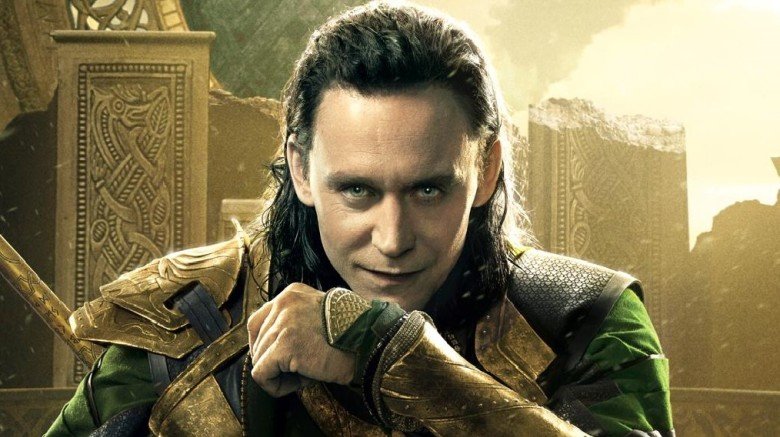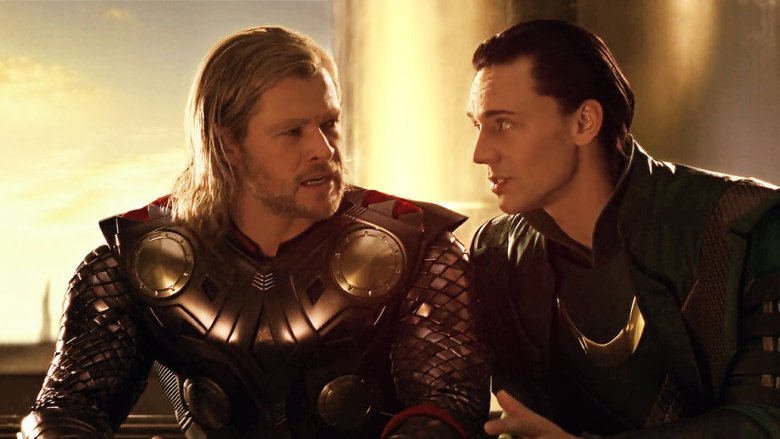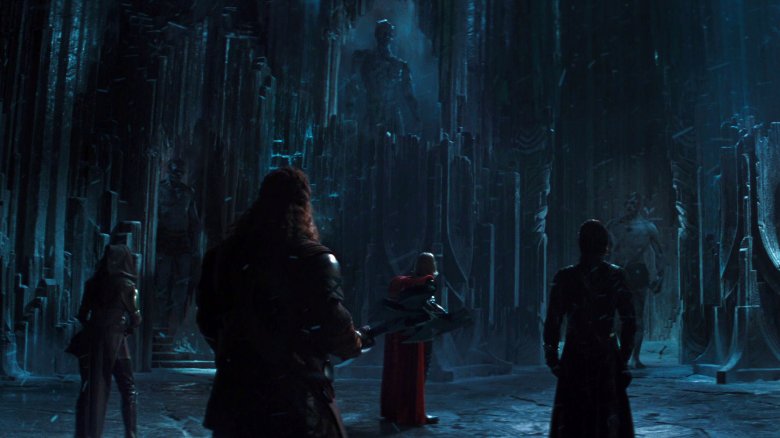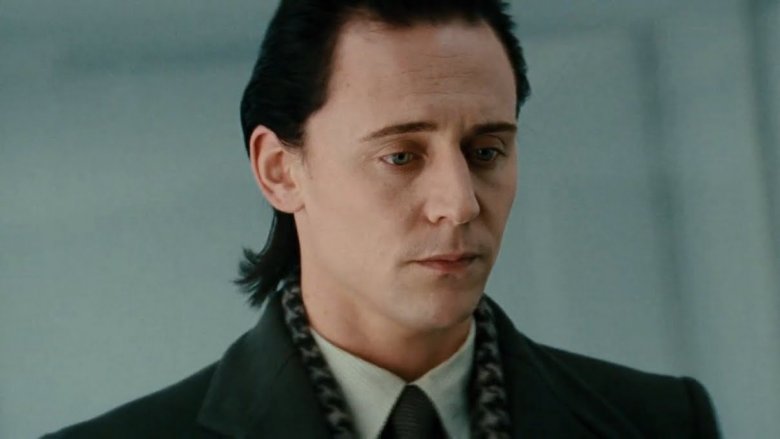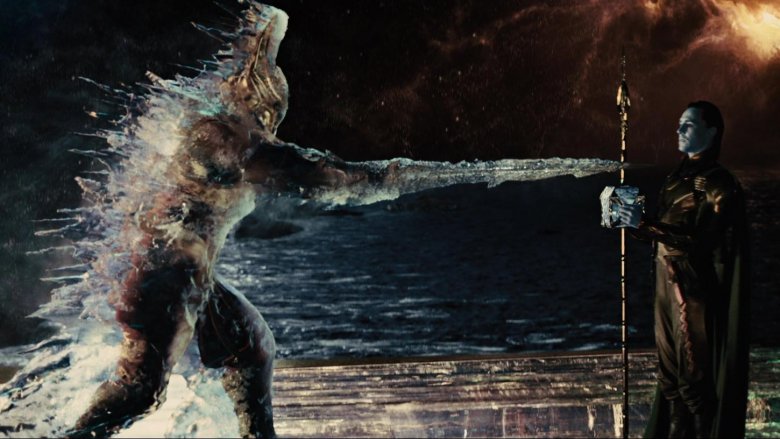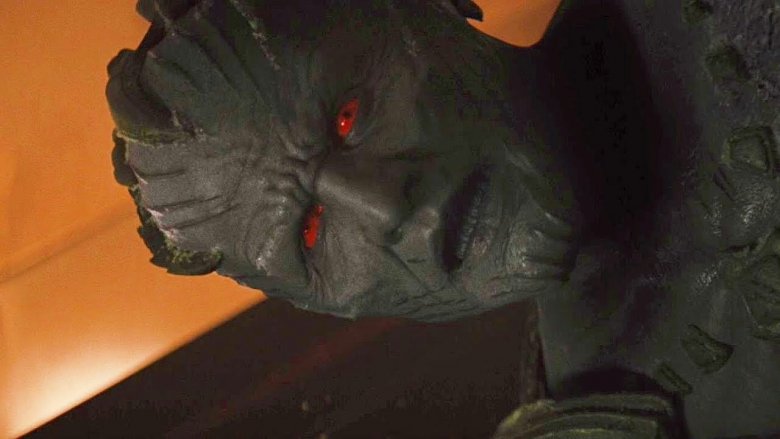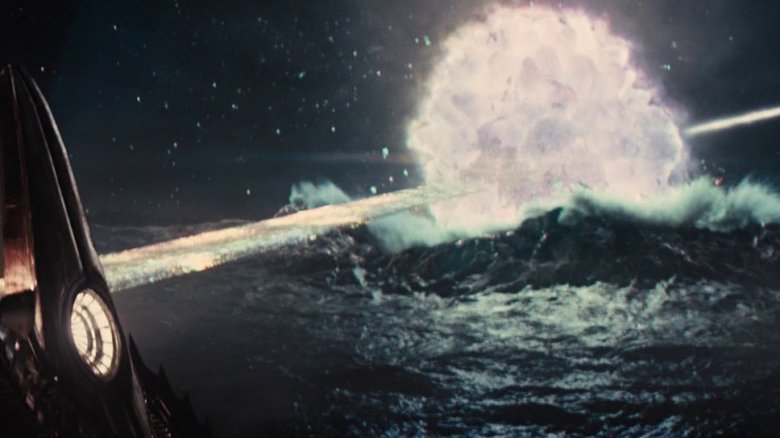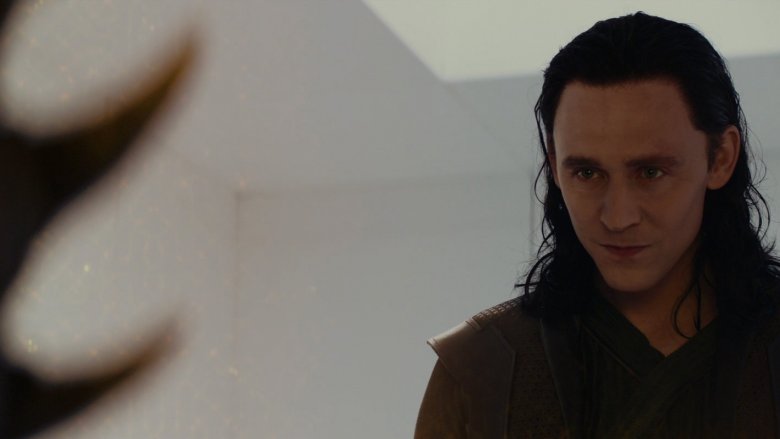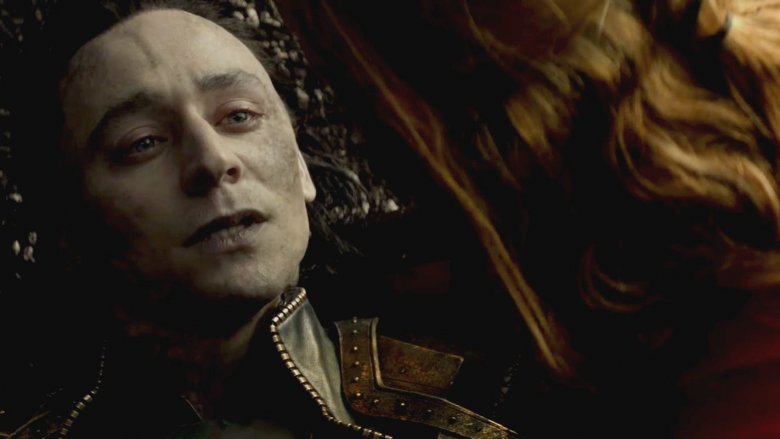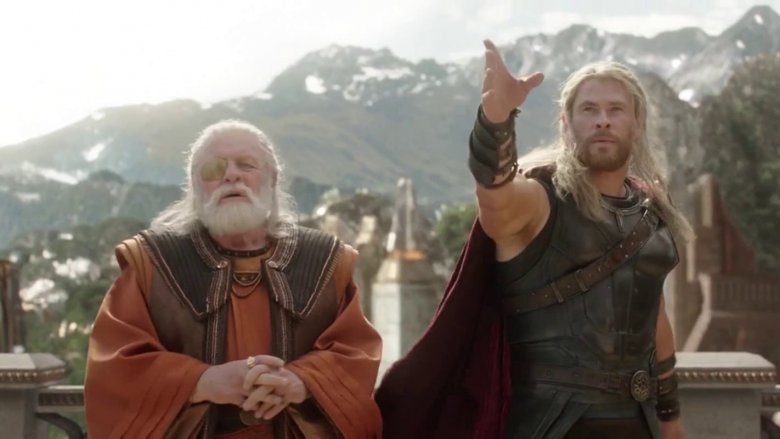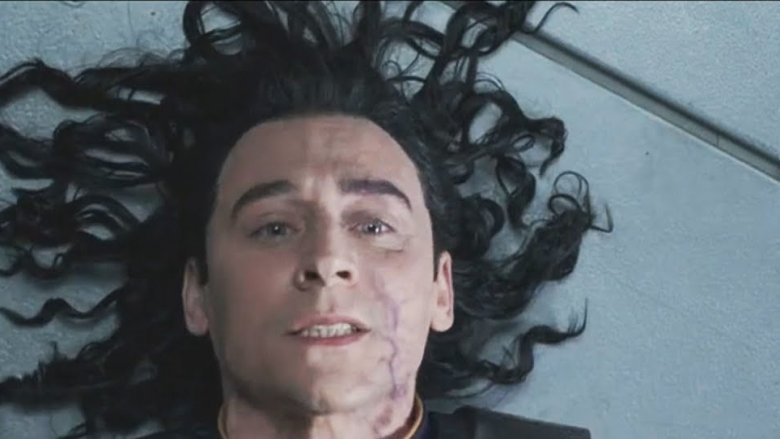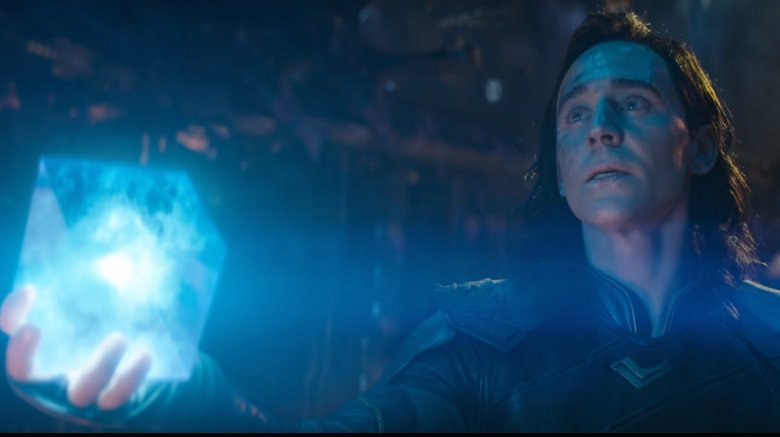Reasons Why Loki Is Still A Villain And Always Was
There's been a lot of talk lately about how Loki, as he's been expertly portrayed by Tom Hiddleston in Marvel's superhero flicks, was never really a bad guy at all. The revisionism began when attentive fans noticed that Loki's official description at Marvel's website was altered to say that his actions during 2012's Avengers were influenced by his possession of the Mind Stone, which was "fueling his hatred over his brother Thor and the inhabitants of Earth." A lot of fans have been taking this to mean Loki died a good guy, and he was never a bad guy to begin with.
But we have to question those fans' interpretations. The description reads that the stone "influenced" Loki. It nudged him. If you say you want to do something and your buddy tells you it's a good idea, your buddy influenced you, but he didn't make you do anything. The description says the stone "fueled" Loki's hatred. It didn't create the hatred. If you're already in a bad mood and then you stub your toe, hurting your toe didn't make you mad — it just intensified what was already there.
Leaving Avengers aside, Hiddleston has starred in four other MCU films in which he was not in the possession of the Mind Stone. If you judge someone by their actions, then the three Thor films demonstrate what everyone is starting to forget: that Loki is a villain and he always was.
A traitor from the beginning
We were introduced to Tom Hiddleston's Loki in 2011's Thor, long before he held the Mind Stone and became the temporary ally of Thanos. If you weren't familiar with the comics, you might've thought he was a good guy in the beginning. He appeared sympathetic to Thor's frustrations with Odin's inaction in the face of a frost giant incursion, he fought alongside Thor in Jotunheim, and from the dialogue we hear in Asgard's House of Healing between the Warriors Three and Sif, you get the impression Jotunheim was just one of many adventures they'd all shared.
But from the very beginning, Loki was scheming and he didn't care about the collateral damage. Just consider the event that triggers everything: a handful of frost giants sneaking into Odin's trophy room in an attempt to steal back the Casket of Ancient Winters. We learn later it was Loki who showed the giants how to get to Asgard without using the Bifrost, thereby setting everything in motion. All the frost giants are killed by the Destroyer, but the trophy room's guards are murdered by the giants before the automaton can stop them.
Everything that follows springs from this event. Loki doesn't care about the lives lost on either side. And what would've happened if the blue guys actually managed to get away with the Casket... or something more powerful?
With friends like these...
While he never explicitly admits to it — and makes a big show of trying to dissuade Thor from doing it — it's made obvious that the only reason Loki even mentions the idea of Thor going into Jotunheim is to get the still-naive thunder god to do just that. The Warriors Three and Sif join the pair. Volstagg is wounded, Fandral almost dies, and too many frost giants to keep track of are dead before Odin finally spirits the group back home.
So, to get his plot off the ground, Loki risks the lives of his brother and his friends (or those who consider themselves his friends), starts a war, and gets so many frost giants killed that no one in the Nine Realms could get their refrigerators delivered for months.
But look at that. Not an Infinity Stone in sight. Imagine how would you would feel if you put something in motion that got one person killed. Then think about how many people (frost giants included) Loki indirectly kills in Thor in the very first act, even before Odin strips Thor of his powers and exiles him to Earth. Loki never needed magic stones to make him a villain. He just needed to be awake.
Dad's dead... psych!
Once Odin falls into his coma-like "Odinsleep," Loki takes Asgard's throne for himself. Of course, there's the lingering problem of Thor. Earlier in the film, Loki was at the Bifrost when Odin cast his spell on Mjolnir and hurled it after his exiled son. He may not know the exact nature of Odin's spell, but Loki clearly knows Odin had given Thor some kind of "out." In order to secure his throne, Loki has to keep his adoptive brother in exile. Doing something overt like killing him would show his hand, so instead he chooses to secure Thor's exile by taking away the thunder god's desire to go home.
Loki not only lies and tells Thor his father is dead, he tells Thor it was from the emotional strain of needing to exile his eldest son that killed him. Essentially, Loki convinces Thor that he killed his own father, and he does it while Thor thanks him. Ultimately, Loki's deception serves to help Thor learn the humility he needs to be worthy of Mjolnir. At the time, though, it fills him with such shame that he doesn't think he deserves to go home, so why would he even try?
Tell us again about how Loki needed to a Mind Stone to be a villain?
Freeze!
Loki would rather kill you with his machinations than with his own hands. The first time he directly attacks an Asgardian is when he uses the Casket of Ancient Winters, freezing Heimdall to allow Laufey and his frost giants into Asgard. Heimdall eventually breaks free, kills the giants guarding him, and activates the Bifrost to bring Thor back home. Still, the consequences of Loki's actions could have been much more final.
If one of the frost giants had been in a particularly sadistic mood while passing Heimdall, it wouldn't have taken much to kill him. One swift crack to the body and the guardian would've been so much bloody ice on the rainbow bridge. When you consider the events not only of the rest of Thor, but of the following two Thor films and Infinity War, it isn't tough to imagine how things could have gone bad on a cosmic scale if Heimdall had died that early in the MCU's history.
Hi Dad, Bye Dad
Loki is the god of mischief for a reason. His deceptions are rarely one-dimensional. We think he's using the frost giants to kill Odin and take the throne of Asgard permanently, but once he leads Laufey and his men into Odin's bedchambers, we learn that isn't Loki's plan at all. He knocks Laufey — his biological father — off of Odin and vaporizes him, playing at being Odin's protector. Loki never meant to kill Odin. By leading Laufey and his giants into the deathtrap, he meant only to manufacture a situation that would prove to Odin and the rest of Asgard that he — and not Thor — was fit to be the successor to the throne.
Loki murders his biological father without any hint of hesitation. Loki never says anything about how he feels towards Laufey, but his actions speak volumes. As much as Loki may despise Odin for hiding his parentage for so long, the fact remains that Odin is the one who raised him, and it's Odin's approval he desperately craves. He craves it enough to not only murder his bio dad, but to murder a bonafide head-of-state. And not just a president or a king — the ruler of an entire world.
Genocide
Even though Loki's plot is revealed, the god of lies ends 2011's Thor with an attempt at genocide. Using the Bifrost as a weapon, Loki means to destroy Jotunheim entirely and murder every frost giant in existence. And mind you, Loki isn't trying to commit genocide for any twisted ideals or to protect Asgard. Loki's need to destroy Jotunheim has less to do with politics or even personal ambition than it does with his own need to eradicate a side of himself he has utterly rejected. After years of believing himself to be one thing, he has learned he is another.
Yeah, that's rough and a little overreaction is understandable, but Loki's overreaction would — if successful — mean the murder of an entire race of people. As much as the frost giants seem to be jerks a lot of the time, we doubt their families are going to watch their world crumbling around them and clutch their babies to their frozen chests and think, "Well, at least maybe Loki will find some closure."
Loki tries — and thankfully fails — to commit the worst kind of crime anyone has ever committed. This is all without any Infinity Stones, scepters, purple-faced space villains, or Chitauri warriors in sight.
Directions
Loki returns to Asgard in chains at the beginning of 2013's Thor: The Dark World. In this second Thor installment, Loki proves not only that he's still a villain without the Mind Stone influencing him, but that he can be an evil jerk accomplishing evil things even from the comfort of his prison cell.
When Kurse escapes from his cell and starts freeing the rest of the prisoners, he doesn't do it out of altruism — he does it to cause chaos. Something makes him stop short of freeing Loki. He doesn't say exactly what it is, but something about Loki bothers the elf. Regardless, Loki still helps him. As Kurse walks away, Loki gives the elf directions to the palace's shield generator even though he's the only prisoner Kurse doesn't free.
With a few words, Loki contributes not only to the deaths of at least dozens of Asgardian soldiers, but to the murder of his own mother. Obviously, Loki can't tell the future and had no way of knowing that would happen. But he had to know it was a possibility. He knew the destruction of the force field would mean anyone in the palace was fair game, including his mother. He knew someone would die because of it, and likely more than a few someones. Since the elf who did it wasn't even willing to free him from his cell, Loki didn't even do what he did for a practical reason like freeing himself; he did it purely out of spite.
I'm dead... psych!
In actual Norse myths, the wolf Fenris and the snake Jörmungandr were both Loki's children. But the MCU version of Loki? He has more in common with a possum, as in playing it. After all, one of Loki's favorite things to do is pretend to die.
His first "death" was at the end of Thor, but it's likely few audience members were fooled by that. His fake death in Thor: The Dark World, though, is another matter. Using his magic, Loki makes it appear he has been run through by the dark elf Kurse, and then dies in his brother's arms. However, in the film's final moments, we learn that it was all an illusion and that Loki has somehow used his fake death to capture the throne of Asgard, disguised as Odin.
Even forgetting for the moment that Loki has incapacitated Odin with his magic (we're never shown exactly how that happened), he also puts his brother through hell. Though they've managed to work together to escape the dungeons of Asgard and to attempt to keep the Aether away from the dark elves, Loki allows his brother to believe he died on Svartalfheim. Thor's agony over the "death" is apparent, and no Mind Stone is pushing Loki to be an evil jerk or stopping him from letting his brother know he's alive.
Chaos Reigns
The beginning of 2017's Thor: Ragnarok finds Loki, disguised as Odin, laying about and watching a play honoring his own "death" when Thor arrives. As Loki/Odin sees Thor, we get the rare treat of hearing Anthony Hopkins blurt out a quiet cuss before Thor uses Mjolnir's magic properties to force Loki into revealing himself.
The scene is so funny that it might be easy to miss that, years since he's been within 100 miles of the the Mind Stone, Loki continues to be responsible for the deaths of... well, we never find out exactly how many people, but a lot.
Before Thor plays his little game of Mjolnir-chicken with Loki/Odin, he tells his disguised brother that he's been traveling through the cosmos, hoping to discover clues about the Infinity Stones. He tells Loki/Odin that the Nine Realms, the worlds under Asgard's protection, are in chaos. War is raging, people are dying, and the armies of Asgard are doing nothing.
So, not only does Loki's usurping of the throne indirectly lead to the death of the real Odin, the rise of Hela, and ultimately the destruction of Asgard; before any of that happens, he's already helping to spread death across the cosmos by sitting on his hands rather than acting as Asgard's king ought to.
I'm totally a good guy now... psych!
Even after Thor and Loki both get their butts handed to them by their sister and find themselves exiled to the planet Sakaar, Loki still isn't done being a piece of garbage. When Thor leads an escape attempt, Loki cooperates long enough to commandeer the Grandmaster's pleasure cruiser. But once they're in sight of the spaceship, Loki once again uses that illusory double trick to distract Thor from the fact that he's slipping away.
But finally, Thor has stopped using his head as something other than the Hulk's punching bag, and he's anticipated the betrayal. He's already slapped one of the gladiator control discs on his brother, and he uses it to incapacitate him. He leaves Loki there to writhe, but unfortunately, the well-meaning Korg and his buddies find him and give him a lift to Asgard.
If Loki's betrayal of Thor had gone as planned, the thunder god would never have made it to Asgard. Every last Asgardian would have been slaughtered, Hela wouldn't have been defeated, and she may have already slaughtered half of the universe before Thanos could give it a shot in Infinity War. The Infinity Stones are nowhere in sight, but Loki is still acting every bit the bad guy he's always been.
The Cube
Shortly after stories popped up about the Mind Stone influencing Loki in Avengers, Tom Hiddleston told fans at the ACE Comic Con that Loki's failed attempt to stop Thanos in 2018's Avengers: Infinity War made up for his crimes. He said that Loki's humanization in Thor "makes you always think that he could be pulled back and redeemed." Hiddelston added, "And in my opinion, he is redeemed in Infinity War."
Really? Redeemed? Let's look at that.
Before Asgard is destroyed at the end of Ragnarok, Loki secretly steals the Tesseract from Odin's trophy room. What happens as a result? Thanos assaults the refugee ship in Infinity War only because Loki has the Tesseract. It's possible the Tesseract could have been destroyed along with the rest of Asgard if Loki hadn't stolen it, meaning Thanos' quest would have failed. Loki does nothing to help with the defense of the refugee ship until his failed attempt on Thanos' life. He stands peacefully with the Black Order among the rubble and the dead.
Redemption? He has murdered, he has waged war, and he has tried to destroy entire worlds. He's betrayed his own family on countless occasions. Many of his actions at the end of Ragnarok and the beginning of Infinity War are worthy of praise, but while Loki may have died heroically, he did not die a hero. He had far too many deaths on his hands — most of which he caused without the Mind Stone's influence — to be cleansed by one weak assassination attempt.
